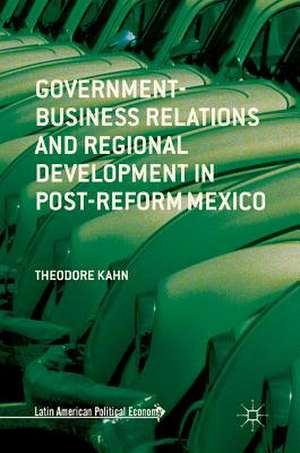Government-Business Relations and Regional Development in Post-Reform Mexico: Latin American Political Economy
Autor Theodore Kahnen Limba Engleză Hardback – 25 oct 2018
This book explores the political economy of subnational development in Mexico. Like much of Latin America, Mexico underwent market reforms and democratization in the late 20th century. In addition to transforming national institutions, these changes led to sharp political and economic divergence among Mexican states. The author offers a novel explanation for these uneven results, showing how relations between local governments and organized business gave rise to distinct subnational institutions for managing the economy. The argument is developed through a paired comparison of two states in central Mexico, Puebla and Querétaro. This work will be of interest to students of Latin American and Mexican politics, regional development, and government-business relations.
| Toate formatele și edițiile | Preț | Express |
|---|---|---|
| Paperback (1) | 386.00 lei 6-8 săpt. | |
| Springer International Publishing – 26 ian 2019 | 386.00 lei 6-8 săpt. | |
| Hardback (1) | 397.97 lei 6-8 săpt. | |
| Springer International Publishing – 25 oct 2018 | 397.97 lei 6-8 săpt. |
Preț: 397.97 lei
Nou
Puncte Express: 597
Preț estimativ în valută:
76.18€ • 82.77$ • 64.03£
76.18€ • 82.77$ • 64.03£
Carte tipărită la comandă
Livrare economică 22 aprilie-06 mai
Preluare comenzi: 021 569.72.76
Specificații
ISBN-13: 9783319923505
ISBN-10: 3319923501
Pagini: 282
Ilustrații: XV, 290 p. 2 illus., 1 illus. in color.
Dimensiuni: 148 x 210 mm
Greutate: 0.65 kg
Ediția:1st ed. 2019
Editura: Springer International Publishing
Colecția Palgrave Macmillan
Seria Latin American Political Economy
Locul publicării:Cham, Switzerland
ISBN-10: 3319923501
Pagini: 282
Ilustrații: XV, 290 p. 2 illus., 1 illus. in color.
Dimensiuni: 148 x 210 mm
Greutate: 0.65 kg
Ediția:1st ed. 2019
Editura: Springer International Publishing
Colecția Palgrave Macmillan
Seria Latin American Political Economy
Locul publicării:Cham, Switzerland
Cuprins
1. Introduction.- 2. Governing Subnational Economies.- 3. Origins and Consequences of Divergent Private Sector Organization in Puebla and Querétaro.- 4. Building Institutions for Cooperation in Querétaro, 1979-1991.- 5. Partisan Rivalry between Government and Business in Puebla, 1981-1993.- 6. Consolidation of a Developmental Alliance in Querétaro, 1991-1997.- 7. Authoritarian Political Economy and Global Integration in Puebla, 1993-1999.- 8. Querétaro’s Rising Star in the Global Economy, 1997-2009.- 9. Institutional Erosion and Economic Stagnation in Puebla, 1999-2011.- 10. Conclusion
Notă biografică
Theodore Kahn is Visiting Scholar in the Latin American Studies Program at the Johns Hopkins University School of Advanced International Studies, USA.
Textul de pe ultima copertă
This book explores the political economy of subnational development in Mexico. Like much of Latin America, Mexico underwent market reforms and democratization in the late 20th century. In addition to transforming national institutions, these changes led to sharp political and economic divergence among Mexican states. The author offers a novel explanation for these uneven results, showing how relations between local governments and organized business gave rise to distinct subnational institutions for managing the economy. The argument is developed through a paired comparison of two states in central Mexico, Puebla, and Querétaro. This work will be of interest to students of Latin American and Mexican politics, regional development, and government-business relations.
Theodore Kahn is Visiting Scholar in the Latin American Studies Program at the Johns Hopkins University School of Advanced International Studies, USA.
Caracteristici
Explains how divergent sub-national developmental institutions can arise out of national political and economic reforms. Illuminates the conditions under which multinational enterprises become active proponents of developmental policies at the local level. Provides a novel explanation for the uneven results of democratization and economic reform across Mexico’s states.














